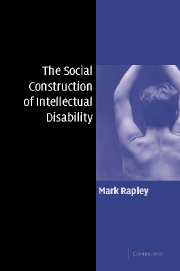Book contents
- Frontmatter
- Contents
- Acknowledgements
- A note on the cover illustration
- A note on transcription notation
- Introduction
- 1 A discursive psychological approach
- 2 Intellectual disability as diagnostic and social category
- 3 The interactional production of ‘dispositional’ characteristics: or why saying ‘yes’ to one's interrogators may be smart strategy
- 4 Matters of identity
- 5 Talk to dogs, infants and …
- 6 A deviant case (written with Alec McHoul)
- 7 Some tentative conclusions
- Appendices
- References
- Index
7 - Some tentative conclusions
Published online by Cambridge University Press: 20 October 2009
- Frontmatter
- Contents
- Acknowledgements
- A note on the cover illustration
- A note on transcription notation
- Introduction
- 1 A discursive psychological approach
- 2 Intellectual disability as diagnostic and social category
- 3 The interactional production of ‘dispositional’ characteristics: or why saying ‘yes’ to one's interrogators may be smart strategy
- 4 Matters of identity
- 5 Talk to dogs, infants and …
- 6 A deviant case (written with Alec McHoul)
- 7 Some tentative conclusions
- Appendices
- References
- Index
Summary
Forms of life are always forms of life forming. Realities are always realities becoming.
(Mehan and Wood, 1975: 32)Truth, that is to say, is always enthroned by acts of violence.
(Rose, 1999a: np)Constructing ‘the person with an intellectual disability’ - ‘the tutelage of experts’
We have examined how it is that psychology, and members of its allied trades, have come to constitute one of their key objects of study: the ‘person with an intellectual disability’. The person under these descriptions is, a priori, socially and interactionally incompetent and suffers from cognitive deficits or conceptual impairments. Or in Alan's words, they are ‘thick like’. Regardless of recent moves by professional associations and publishers of diagnostic manuals to stress the interaction between persons and their environments, and the specification of ‘systems of supports’, rather than the identification of ‘levels’ of retardation (AAMR, 2002), in practice the hypothetical construct ‘intellectual disability’ continues to be reified as a core, or essential, aspect of personhood: or rather, in much of the literature, an unambiguous identity that individuals have, whether they confess it or not.
- Type
- Chapter
- Information
- The Social Construction of Intellectual Disability , pp. 196 - 209Publisher: Cambridge University PressPrint publication year: 2004



